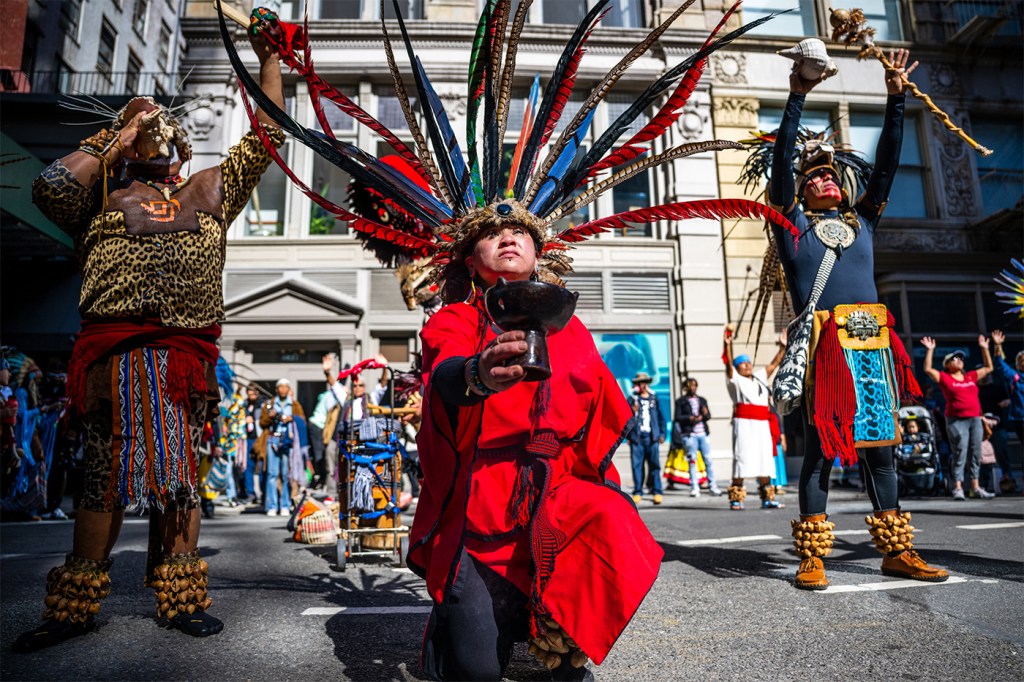Choctaw Native creates space for understanding philosophy of Indigenous Peoples

When Getty Lustila decided he wanted to go into philosophy, he fully committed himself to going to graduate school, getting his doctorate degree and securing a job.
Right around that time, he says, he started reconnecting with his Native American roots in a very private way. He rekindled relationships with those family members who felt a strong bond with their Indigenous heritage and looked for ways to connect with his tribe — Choctaw Nation of Oklahoma.
“For a long time, I just thought about those two parts of myself as very separate from one another,” says Lustila, an assistant teaching professor of philosophy and religion at Northeastern.
Eventually, he had learned that there was a small handful of philosophers in the United States who specialized in Native American philosophy and Indigenous philosophy. This helped him see a way in which he too could devote more space in his professional identity to his Choctaw identity.
Lustila started to include some topics related to Indigenous thought in his environmental ethics course. Last fall, he established the Indigenous Studies Circle — a student-led working group affiliated with the Ethics Institute at Northeastern. He says he saw two purposes for the group.
“A lot of students were interested in and had questions about Indigenous studies [in his classes], and they just didn’t have an outlet for that,” he says. “So it was an opportunity for me to provide that space to do that.”
He also saw it as a chance to lay the groundwork for a future course he wanted to teach — Indigenous philosophy.
The circle ended up running all academic year and has resumed this fall, Lustila says.
“It’s student-led in the sense that we sort of choose session to session or a couple sessions in advance what people are interested in and what [are the] questions that people want to know more about,” he says.
About 15 people attend the circle’s sessions. They meet every other week, Lustila says, after classes.
The circle’s work started with the basic history of Native Americans in the United States, Lustila says, through reading portions of Roxanne Dunbar-Ortiz’s “An Indigenous Peoples’ History of the United States.”
His students also had a lot of questions about Native American history in New England.
“I didn’t grow up out here,” Lustila says, “but I don’t think most of the people that I’ve met out here have had a very good understanding of Native history and also the current Native communities who exist.”
The circle discussed topics such as Indigenous environmental theory and philosophy, legal predicament of Indigenous groups in the U.S., Native representation in films and documentaries, decolonial theory and how certain colonial practices might have influenced the departure of modern understanding of gender and sex from Native thinking.
Northeastern senior Amara Ifeji says that participating in the circle prompted her to engage more with her ancestry. Ifeji, who was born in Nigeria and grew up in Maine, is a part of the Nigerian Igbo tribe and identifies as an Indigenous person herself, she says.
She has learned a lot in the circle, Ifeji says, and is “super grateful” for that.
“It’s been very fruitful. I just always enjoy the conversations with folks,” she says. “I feel like it’s a really deep privilege to be a part of that space.”
Ifeji says that conversations in the circle go on a tangent a lot of the time. She appreciates that there is a lot of room for all kinds of questions, when it comes to exploring indigeneity, Indigenous rights and Indigenous justice.
One of the more unconventional themes, Ifeji says, that the circle explored around Valentine’s Day last year was the concept of love in Indigenous thinking and what it meant to love somebody. “The wealth of knowledge” that she accumulated through the circle, Ifeji says, also advanced her own thesis research on the Igbo people of Nigeria, Igbo women’s political participation and the tribe’s mobilization around environmental injustices and land ethics.
Siyuan Tang, who graduated from Northeastern in May with a bachelor’s degree in business administration with a concentration in finance, was among the first students who joined the Indigenous Studies Circle. Because of the flexible Northeastern curriculum, she was able to study ancient philosophy as her elective in spring 2022, which introduced her to Lustila and brought her to the circle.
Tang says that it helped her not only to learn more about “the original culture on this continent,” but also to hear different personal perspectives of American students since she was the only international student in the circle.
“I don’t think I got this similar chance when in my business classes,” Tang says. “It’s a really cool combination of students.”
In Chinese, the name “Siyuan” comes from an idiom, Tang says, that means gratitude and remembering one’s own roots. Studying Indigenous culture showed her that Native American tribes were also making an emphasis on the sense of gratitude, giving to the community and living in harmony with nature.
“This kind of mentality and life philosophy has always been [at the] core of my personal journey,” she says. “I feel very connected.”
Tang also drew parallels thinking about the settlers’ colonialism in North America with China’s experience of colonizers during the “century of humiliation,” she says, a period when Western powers and Japan intervened and subjugated the Qing dynasty and the Republic of China.
The Indigenous Studies Circle, Tang says, demonstrated to her and is a proof of the rising interest among young students in Native American history, Indigenous culture and advocacy.
Lustila also introduces students to Indigenous futures literature — a subgenre of science fiction that imagines the futures of Native Americans beyond the apocalypse of colonization that, he says, they have already experienced. This month, since it is October, the circle will start reading a freshly published Native dark fiction series, which Lustila describes as horror writing, from an Indigenous perspective.
Next spring, Lustila will start teaching Indigenous philosophy course. It will be one of the few Indigenous philosophy courses taught in the U.S., he says, even though Native American or American Indian studies departments have been around since the 1970s.
“But in philosophy it’s a very, very small world,” Lustila says. “There aren’t that many of us. So there are very few opportunities to study Native thought in a philosophical context.”
Lustila is a part of the Philosophy of Indigenous Education (PINE) network and reading group that unites about 20 currently active Native philosophers. The group hosts an annual workshop focused on the legacy of boarding schools.
On the personal level Lustila was able to register with the Choctaw Nation and is learning the Choctaw language. He feels that he is now in a position to try to do whatever he can in his circle to advocate on behalf of Native issues and native communities who are present in the U.S. One way to do it is through his classes.
If you are interested in expanding your knowledge about Indigenous peoples here are some recommendations from professor Getty Lustila:
- A new collection of Native horror writing “Never Whistle at Night: An Indigenous Dark Fiction Anthology” edited by Shane Hawk and Theodore C. Van Alst
- Indigenous environmental thought – “The Indigenous Fight for Environmental Justice, from Colonization to Standing Rock” by Dina Gilio-Whitaker
- Indigenous Political Resurgence and Indigenous feminism – “As We Have Always Done: Indigenous Freedom through Radical Resistance” by Leanne Betasamosake Simpson
- Classic Indigenous literature and memoir – “Bad Indians: A Tribal Memoir” by Deborah A. Miranda
- A recent collection on Indigenous philosophy – “Ways of Being in the World: An Introduction to Indigenous Philosophies of Turtle Island”
Alena Kuzub is a Northeastern Global News reporter. Email her at a.kuzub@northeastern.edu. Follow her on Twitter @AlenaKuzub.






